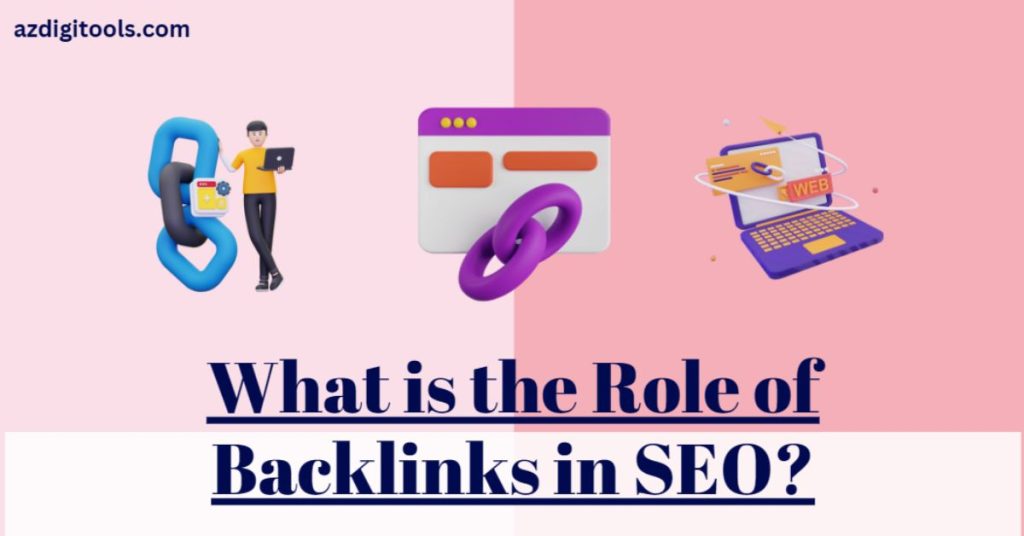
Do you want to know the role of backlinks in SEO? If yes, then this full article is for you.
Well, Search engine optimization (SEO) is the practice of optimizing websites so they are ready for discovery and ranking by search engines like Google. One component of this process involves building backlinks from other sites back to yours – commonly referred to as backlinking and one of the most valuable off-site SEO practices available today for businesses.
Backlinks can be thought of as votes of trust from one website to the next. When high domain authority and relevance websites link back to your content, they send signals to search engines that your page contains valuable information and, therefore, remains an effective off-site ranking factor (according to research from Ahrefs). This explains why backlinks continue to play such an integral role in search rankings.
For optimal backlink-building results, content that provides value will eventually attract links from other relevant websites that will boost your search engine rankings over time. Be careful when using unethical methods of link-building, which could result in penalties from Google that could harm long-term rankings performance.
Backlinks may no longer be as powerful, but they remain an essential component of off-site SEO. By adhering to best practices and producing useful content, backlinks can still play a vital role.
Role of Backlinks in SEO?
1. Authority Building
Backlinks can help expand the topical authority of your website. When other websites link to the content you produce about a particular subject, Google recognizes this and considers your page an authoritative source on that particular matter, increasing rankings in SERPs, reputation, and brand reach.
However, it’s important to keep in mind that not all backlinks are created equal; in fact, some may even be considered spammy by Google and could lead to you being penalized by them. Therefore, it’s wiser to focus on creating natural, organic backlinks from quality sites.
When other websites link to your content, they transfer some of their domain authority or “power” onto you through linking pages of your website (and shared among them according to the PageRank algorithm).
For example, when local news websites link directly to you, it can boost your homepage authority, but if they also link other pages within your site, then some of this authority can pass onto them too – this process is called link equity distribution and an important aspect of SEO processes.
2. Enhanced Visibility
Google and other search engines have become more sophisticated over time, relying on various factors for ranking web pages. Backlinks still play an essential role in helping search engine algorithms discover and rank pages more quickly.
However, quality has become as important as quantity when it comes to backlinks. Authority websites tend to favor backlinks from high-quality domains more heavily, and link quality is determined by several factors, including domain authority, relevancy of text used within the backlink, and context in which the link appears on the linked page.
Backlink positioning on linked pages also affects link value; for instance, backlinks from gluten-free bakeries tend to pass less link equity than ones from mountain climbing gear stores; this demonstrates why it is crucial to diversify your link-building strategy.
3. Traffic Generation
Backlinks can generate website traffic to your website through links people click on, increasing organic search engine rankings and brand visibility. But it should be remembered that backlinks do not work immediately; their effects take time to show themselves, with results often unpredictable and inconsistent.
Backlink quality is crucial to SEO success. Links should come from high-authority sites with strong authority and power, relevant to your topic, and contextually embedded within relevant content on linking pages, which sends strong relevance signals to Google algorithms.
At one time, backlink generation was all about quantity over quality. Now, however, quality backlinks are more important than ever – one way to gain quality links is through building relationships with bloggers in your niche and creating high-quality content that others want to link back to – this will create more natural backlink profiles that have an increased chance of positively affecting SEO rankings.
4. Indexing and Crawling
Backlinks help search engines like Google index pages on the web. Also referred to as inbound or external links, backlinks are one of the primary components of SEO; Google’s algorithm considers both quantity and quality when ranking websites based on keyword phrases; backlinks serve as votes of confidence that convince Google a webpage is useful and authoritative.
Backlinks from quality websites that possess authority and trust are among the best backlinks. Relevant to their subject matter and with natural anchor text, these backlinks should also be contextually placed, for instance, within an informative blog post or article related to your topic.
Avoid low-quality backlinks that appear spammy, such as PBNs (private blog networks), paid links or keyword-rich comments, as these could all be part of an elaborate link scheme.
Backlinks are one of the most potent ranking factors and can play an essential role in any SEO strategy by increasing visibility, traffic, and authority on websites.
5. Anchor for Relevance
Backlinks can serve as an indicator to search engines that your content is relevant and help search engines understand its context so they can rank pages more appropriately. Links from more relevant websites tend to pass more link equity.
To maximize the relevance of your backlinks, it is crucial that you carefully evaluate their source. Low-quality websites, spammy networks, and paid links (which exchange goods or services in exchange for links) should all be avoided as sources for links.
An effective strategy for building high-quality backlinks is by sharing valuable and informative content and encouraging other blogs and websites to link back to it as relevant resources.
Furthermore, keeping anchor text relevant helps search engines detect any possible manipulation or false positives – for instance, if your target market is golf, linking to articles about selecting an ideal 9-iron rather than general fitness or weight loss articles would likely prove more relevant.
6. Link Equity Distribution
Link equity (formerly PageRank) is a ranking factor used to influence search engine results pages (SERPs). This factor considers several criteria, such as authority, topic relevance, and anchor text of linking pages that influence SERP rankings.
While building backlinks from credible sources is no longer as essential, building quality backlinks from such sites is still an effective way to increase website visibility in SERPs and build trust with Google while establishing a more genuine online presence.
Internal links can help your website efficiently spread link equity across pages by creating a logical structure and signaling relationships between pages.
In addition, internal links can improve SEO by driving traffic towards more pertinent pages, but to make the most out of internal linking strategies, you must ensure all links function as intended – for instance, if any backlink points to an obsolete or irrelevant page, you should use 301 redirects so the link goes straight to more pertinent ones on the website.
7. Relationship Building
Backlinks are an essential element of off-page SEO. Search engines use backlinks as footprints of relevance and authority on a website for certain keywords, often called its link profile. A collection of backlinks is known as its “link profile.”
Link building involves obtaining links from reputable websites in your field of expertise to demonstrate that you are an authority and increase visibility as a business. Collecting links from diverse websites also helps build relationships with prospective customers in your target market.
Create and share valuable content on your website to gain backlinks, such as a resource guide, article on an issue relevant to your niche, or video interview.
Other websites may notice and link back to this valuable content if they find it useful or interesting – for instance, a golf blog could share an article you wrote on choosing the appropriate 9-iron as an additional resource.
Final Words
Backlinks are one of the key off-page SEO factors and play a crucial role in SEO. Search engines use backlinks to determine relevance and authority, thus helping improve ranking on Google.
But not all backlinks are equal: quality should be distinguished from spammy ones by distinguishing between natural-appearing backlinks with keyword-rich anchor text links, non-related websites that link out, or sitewide links appearing across all pages on a website.
Backlinks used to be all about numbers, but since Google introduced sophisticated algorithms and AI into search engine rankings, quality has become the key component.
Businesses must focus on creating high-quality backlinks from reliable sources that meet authority, power, and relevance criteria. If not done so carefully, they risk falling foul of web spam rules and getting penalized. It is, therefore, essential for them to hire only experienced link-building specialists to build their backlinks for them.





